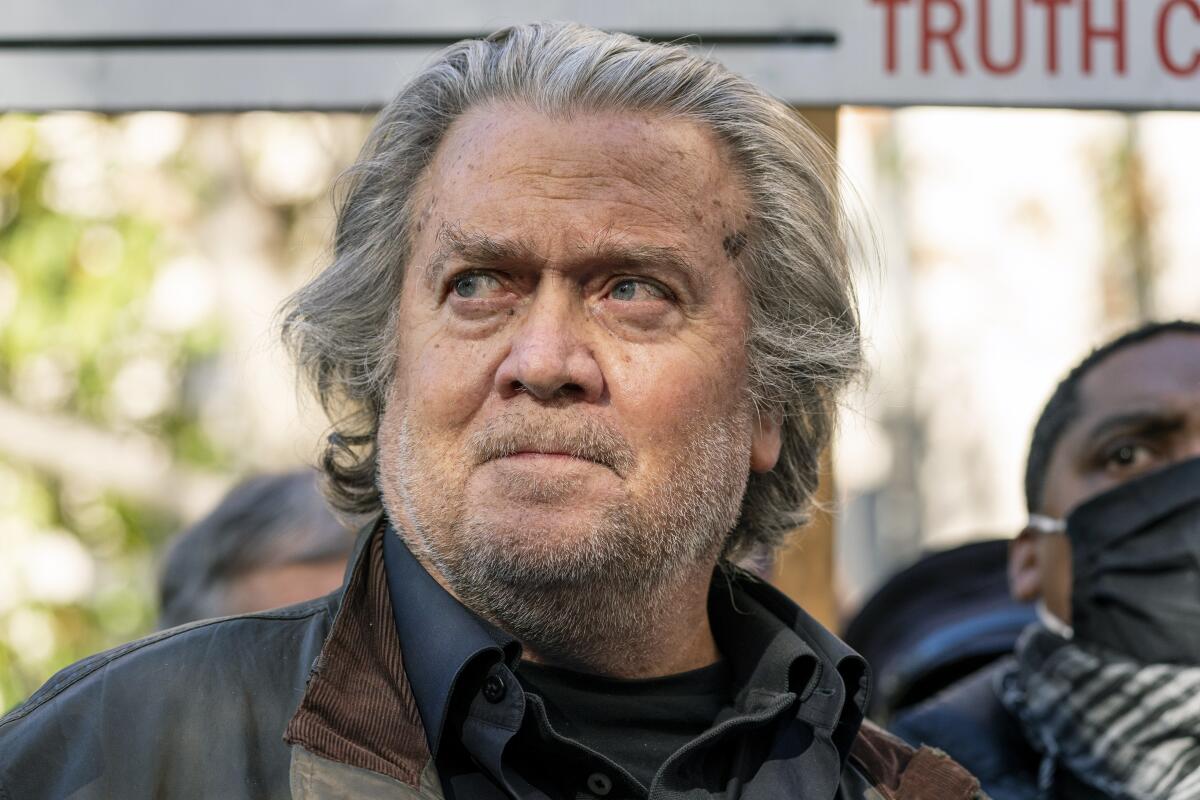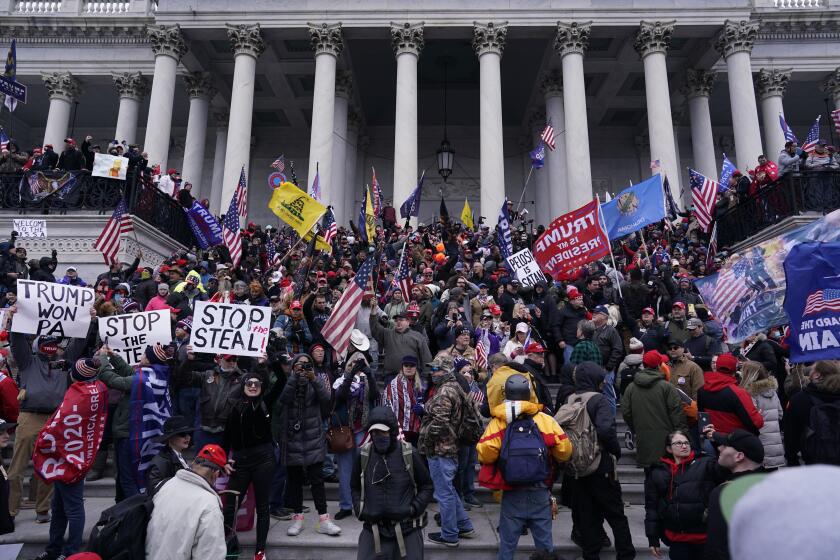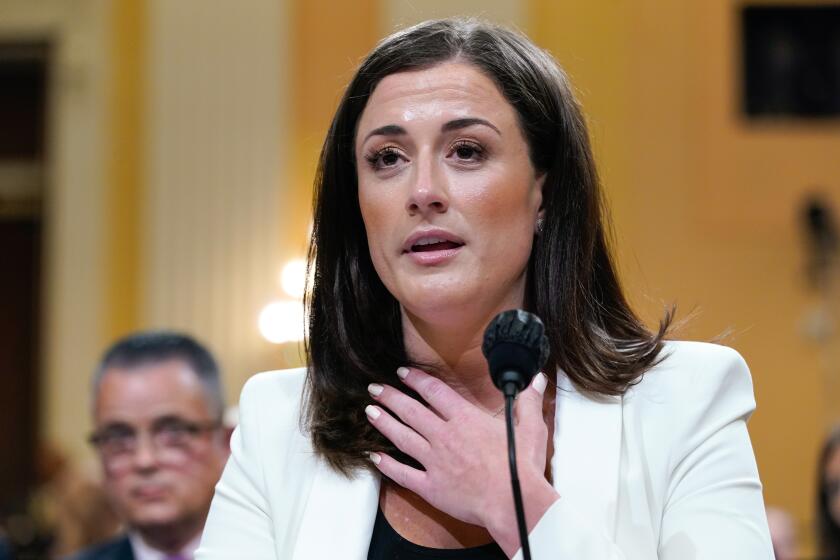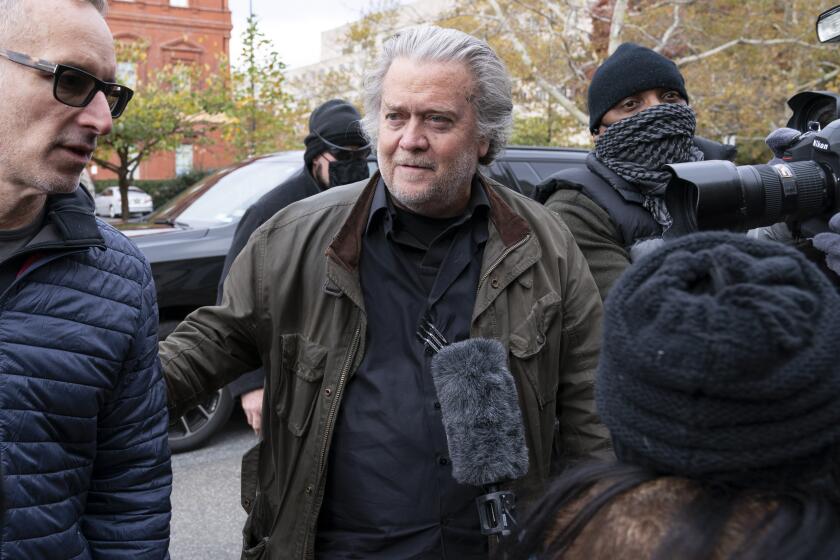Judge won’t delay contempt trial for Trump ex-advisor Steve Bannon

- Share via
WASHINGTON — A federal judge Monday declined to delay the upcoming trial of Stephen K. Bannon, a onetime advisor to former President Trump who faces contempt of Congress charges after refusing for months to cooperate with the House committee investigating the Jan. 6 Capitol insurrection.
Bannon is still scheduled to go on trial next week despite telling the House committee late Saturday that he is now prepared to testify. It’s unclear whether Bannon will again decline to appear before the committee with the trial pending.
Bannon was also barred from asserting several potential defenses or calling House Speaker Nancy Pelosi (D-San Francisco) or members of the House committee to the stand. The series of rulings by U.S. District Judge Carl Nichols left one of his attorneys complaining that the former White House senior official, now host of the “Bannon’s War Room” podcast, wouldn’t be able to defend himself at all.
Barring an appeals court ruling or another delay, the trial will begin as the House committee continues its high-profile hearings into the riot. Testimony by former White House aides has revealed new allegations that Trump knew the crowd was heavily armed and that he tried to join the people marching to the Capitol.
Nichols also barred Bannon’s attorneys from arguing that the committee violated House rules in demanding Bannon’s appearance or that Bannon defied the subpoena on the advice of his defense counsel or on Trump’s order.
And Nichols declined to delay the trial from its current start Monday, saying any concerns about pretrial publicity because of the hearings could be addressed during jury selection. If it proves impossible to pick an unbiased jury, the judge said he would reconsider granting a delay.
What does it mean for the Jan. 6 committee to try to connect those in Trump’s orbit to the Capitol violence?
Bannon could potentially argue that he thought the deadline to respond to the subpoena may not have been “operative” or that the date to respond could have been moved, said Nichols, who was nominated to the bench by Trump.
The rulings led one of Bannon’s attorneys, David Schoen, to speak out in frustration as he sought clarification from the judge.
“What’s the point of going to trial here if there are no defenses?” Schoen asked.
“Agreed,” Nichols responded.
Former White House aide Cassidy Hutchinson held the nation’s attention. But her testimony was just one ingredient in the committee’s high drama.
Bannon did not appear in court Monday. Speaking to reporters outside the courthouse, Schoen said he questioned whether Bannon could effectively defend himself given Nichols’ rulings and hinted that he would appeal.
“He’s the judge,” Schoen said of Nichols. “That’s why they have a court of appeals.”
The 68-year-old Bannon had been one of the highest-profile Trump-allied holdouts in refusing to testify before the committee, leading to two criminal counts of contempt of Congress last year for resisting the committee’s subpoena. He previously argued that he was shielded from testifying by Trump’s claim of executive privilege.
Trump has repeatedly asserted executive privilege — even as a former president — to try to block witness testimony and the release of White House documents. The Supreme Court in January ruled against Trump’s efforts to stop the National Archives from cooperating with the committee after a lower court judge noted, in part, that “presidents are not kings.”
News Alerts
Get breaking news, investigations, analysis and more signature journalism from the Los Angeles Times in your inbox.
You may occasionally receive promotional content from the Los Angeles Times.
The committee has also noted that Trump fired Bannon from the White House in 2017 and Bannon was thus a private citizen when he was consulting with the then-president in the run-up to the riot.
Bannon was indicted in November on two counts of criminal contempt of Congress, one month after the Justice Department received a congressional referral. Each count carries a minimum of 30 days of jail and as long as a year behind bars.
Speaking to reporters after his arrest, Bannon said he was “taking on the Biden regime” and added: “This is going to be a misdemeanor from hell for Merrick Garland, Nancy Pelosi and Joe Biden.”
But Bannon contacted the committee over the weekend after Trump issued a letter saying he would waive any claim of executive privilege to testify before what the former president called an “unselect committee of political thugs and hacks.”
Trump ally Steve Bannon’s appearance in federal court on contempt charges provides a rare glimpse into one of Congress’ least-used powers at work.
Federal prosecutors argued Monday that Bannon’s new offer to appear wouldn’t change any criminal offense committed by not appearing earlier. Randall Eliason, a former prosecutor who now teaches law at George Washington University, agreed with that view.
“This is a criminal contempt,” Eliason said. “You can’t erase the charge by deciding to show up later.”
More to Read
Sign up for Essential California
The most important California stories and recommendations in your inbox every morning.
You may occasionally receive promotional content from the Los Angeles Times.













